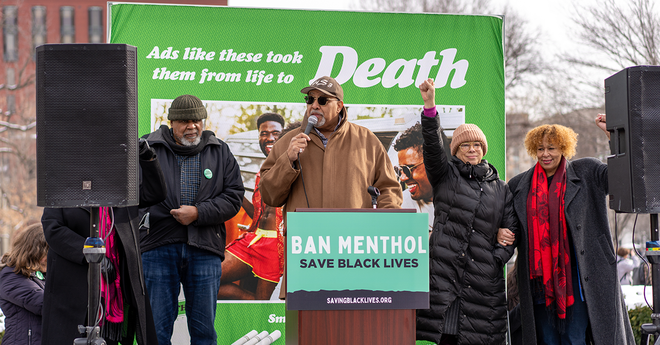3 lessons on preventing loopholes in flavored tobacco restrictions
The Food and Drug Administration has proposed rules that would remove menthol cigarettes and flavored cigars from the market, a historic, long-awaited action that could prevent hundreds of thousands of premature deaths.
Menthol cigarettes, which are easier to smoke and have long been an on-ramp to smoking for young people, have been repeatedly exempted from legislation on flavored tobacco products, the result of massive tobacco industry lobbying efforts. Flavored cigars also appeal to youth – they are sold in over 250 flavors such as banana smash, cherry dynamite, and chocolate, as well as menthol. These products have long been targeted to Black Americans, who use them at disproportionately high rates.

As the proposed rules undergo a public comment period, aggressive opposition from the industry – which has fought menthol restrictions at the local and federal level for years – is expected to continue. To ensure the final rules are strong, the FDA must protect against tobacco industry efforts to skirt the law. The tobacco industry, despite its rhetoric to be part of the public health solution to end smoking, historically obstructs and delays public health policies to reduce tobacco use.
The FDA should do the following three actions – lessons learned from failures of past tobacco regulations – to prevent loopholes in its final rules.
1. Finalize and implement the rules as soon as possible.
Otherwise, the tobacco industry may be able to flood the market with new brands to be used as alternatives to menthol cigarettes. This happened in the EU. During the long implementation period for the removal of menthol cigarettes from the market, cigarette companies introduced products that didn’t say “menthol” but still contained significant amounts of it. The FDA proposed rules are currently in a review period that began on May 4.
2. Make the final rules comprehensive enough to block evasive product engineering and marketing tactics.
In the U.S., companies have already tried to dodge local sales restrictions on flavored products by using “concept” flavors. These vague, non-characterizing descriptions on packages – like Ice, Green, and Blue Mix – communicate a flavor profile without naming a specific flavor designation. In the EU, through product accessories such as “flavor cards” and wrappers with capsules, the tobacco industry has skirted the EU’s removal of flavored tobacco products from the market.
The FDA proposed rules are more robust than the EU flavored tobacco restriction in that they apply to components and parts as well as the tobacco product itself, and contain several important factors that FDA will use to determine whether a cigarette has a characterizing flavor such as menthol. However, in finalizing the rules, the agency must stay vigilant to prevent tobacco companies from thwarting these measures.
3. Allow no substitutions and issue the final rules as close together as possible.
When the U.S. 2009 Tobacco Control Act prohibited the use of characterizing flavorings in cigarettes, but exempted menthol, an increase in smoking of menthol cigarettes among youth occurred immediately after the ban took effect, suggesting a substitution effect between flavored tobacco products. Youth also switched to other flavored products, such as cigars.
To prevent substitutions like this, FDA must not allow exceptions to these rules and should try to finalize and implement both the menthol cigarette rule and the flavored cigar rule as close together as possible. Further FDA must swiftly remove products that do not meet the standards, ensuring that no new products are allowed on the market without going through the appropriate review processes.
Truth Initiative urges the agency to expand its historic action on menthol cigarettes and flavored cigars to eliminate all flavored tobacco products from the market, especially menthol e-cigarettes – a key driver of the youth e-cigarette epidemic. Nearly all young users (82.9%) use flavored products with menthol among the most popular. The benefits of eliminating menthol cigarettes and flavored cigars from the market should not be offset by the authorization of menthol e-cigarettes and other nicotine products that will entice youth.
More in traditional tobacco products
Want support quitting? Join EX Program
By clicking JOIN, you agree to the Terms, Text Message Terms and Privacy Policy.
Msg&Data rates may apply; msgs are automated.



